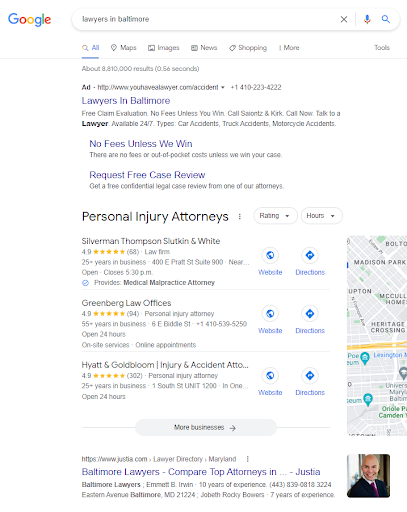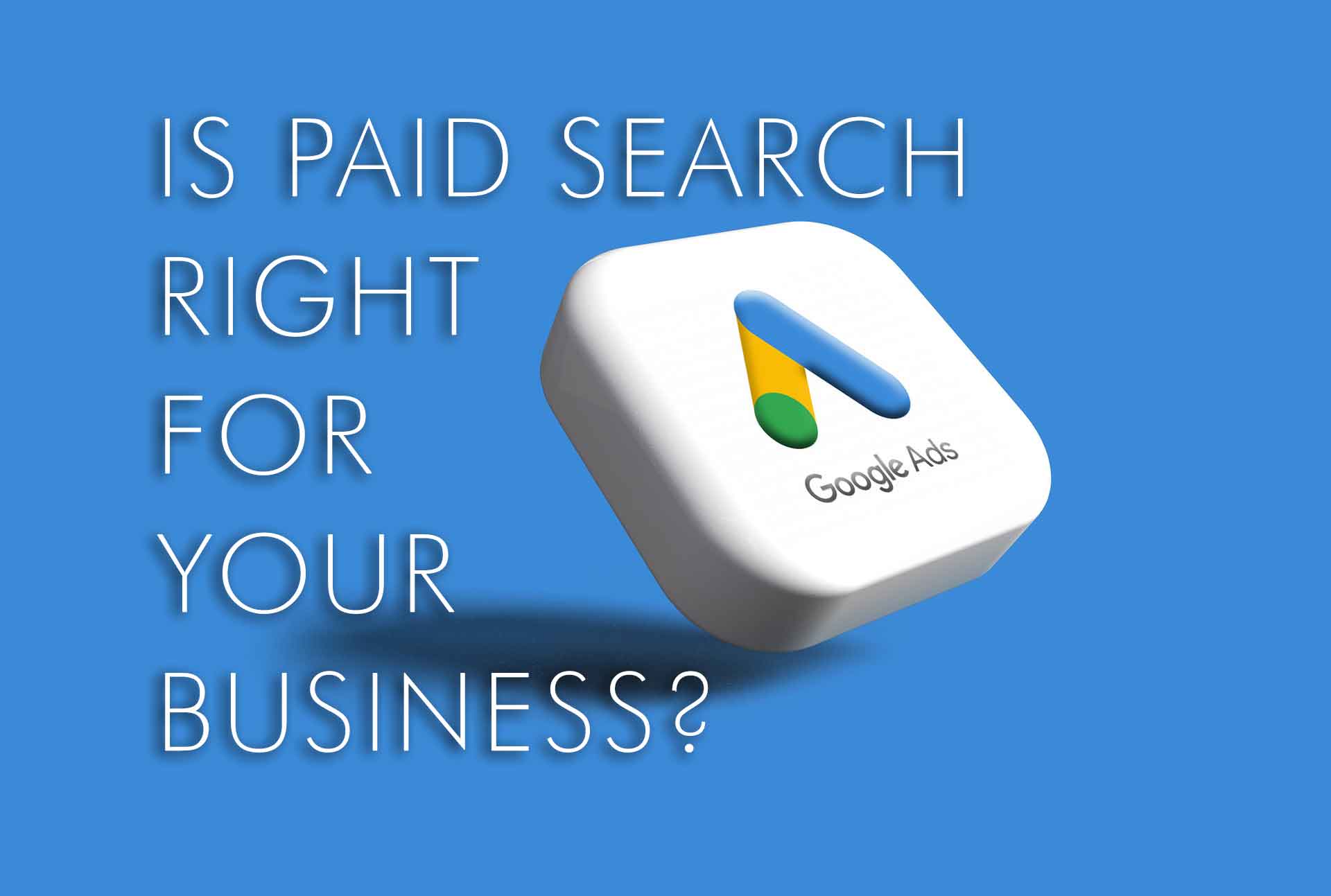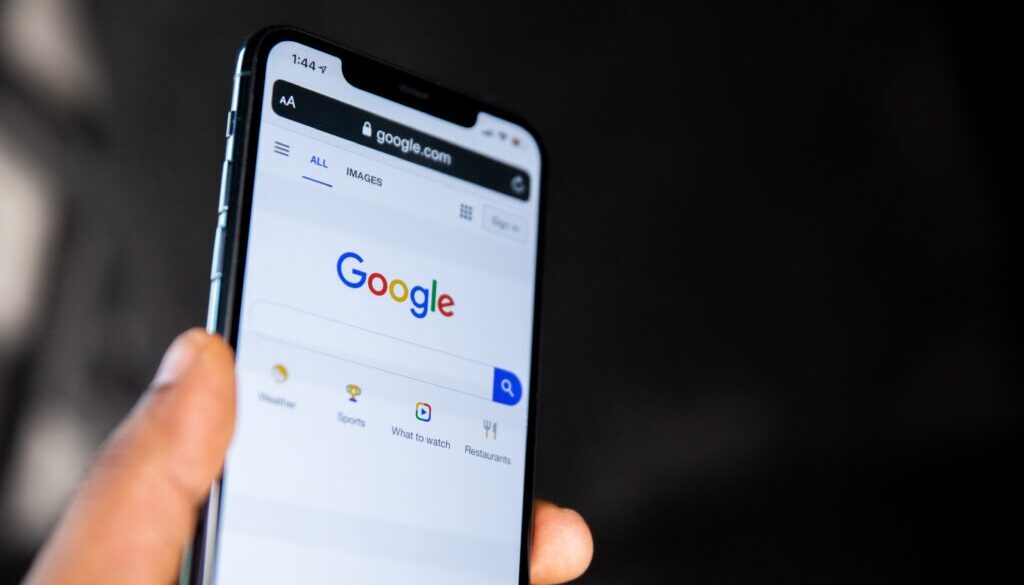Paid Search and Google Ads: Are They Right for Your Business?
We rely on Google for everything these days.
Looking for a new restaurant? Google it. Need to book a dentist’s appointment? Find the phone number on Google. Directions? Google Maps.
Chances are your potential customers are using Google to find a business like yours too.
But is it working? Are you sure that the right customers are finding you?
Search Engine Marketing (SEM) includes strategies that leverage search engines to increase visibility. There are two main ways to do this: Search Engine Optimization (SEO) as an organic growth method, and paid search (Google Ads or Pay-Per-Click, PPC).
When used correctly, both can help boost your sales leads, increase visibility, and improve brand recognition. Here we’ll focus on whether or not paid search is the right strategy for your business.
Search Engine Marketing: PPC vs. SEO

When you input a search query in Google, the page of results that comes up is the SERP (Search Engine Results Page). The ultimate goal of SEM is to rank high on Google, typically showing up on the first page of the SERP.
The SERP has two types of results:
- Paid search results: These are at the top and say “ad” next to them. Paid search results are ads that were bought by companies so they’d be displayed at the top of the SERP, similar to purchasing space for a TV commercial. *Note: There are a number of factors that determine whether an ad shows up at the top of the page—paying for it doesn’t guarantee a top spot.
- Unpaid (or organic) search results: These are located below paid ads and rank according to their SEO (Search Engine Optimization). SEO is determined by factors such as keywords, article relevance, domain authority, and more.
Below is an example of both search results in action. When you search, “lawyers in Baltimore,” you’ll see the paid search ad at the top, followed by organic search results.

The strategy you choose, in addition to your competitors’ strategies, will determine where your website ends up in Google’s SERP when someone searches for keywords related to your business and industry.
Is Paid Search Right For You?

We’re talking about paid search as executed through Google Ad campaigns. Google is the most popular platform and is typically what people choose to use for their paid search marketing strategy.
That said, paid search can be used across other search engines and websites (i.e., Yahoo or YouTube) as well.
Google Ads is a complex topic, but here are the basics you need to know:
- Businesses create ads that correspond to specific keywords that are searched for in Google. This means that businesses need to know what their customers search for.
- Businesses pay Google whenever someone clicks on their ad. This is where we get the term Pay-Per-Click (PPC).
- Businesses can set their overall budget cap with Google Ads.
- Google Ads can be targeted towards specific locations or demographics so that only your target audience sees them when they search for keywords.
Since you’re paying for each ad click, you want to ensure the right people are clicking on your ads. Tailoring your target audience parameters means your budget will be used more efficiently in the campaign.
Specific ads are also more likely to end up at the top of SERP, which is determined by factors like relevant search, audience location and demographics, and how much money is spent on ads.
There’s a competition element to using Google ads—your competitors may also be spending money to hit the top of SERP. If everyone is using the same search keywords, there may be a lot of competition. Therefore, the more specific and tailored you can be, the better.
This is a simplified version of a complex process, but the thing to kep in mind is that Google will ultimately choose the ad it sees as the best fit for the searcher, even if others have bigger budgets behind them.
Google Ads can be pretty complex. If you’re serious about running successful campaigns, it’s a good idea to hire a consultant or invest time and money into learning more. Here are a few resources to dive deeper into Google Ads:
Or, if you prefer a visual guide, the video below provides an excellent paid search overview.
Pros and Cons of Paid Search
Paid search lets you boost the visibility of your business by paying for prime space at the top of the SERP. Here are the pros of using paid search:
- Fast: Your ads can appear at the top of the SERP within days of launching, though a longer campaign may take a few weeks. SEO, in comparison, takes months to achieve a high organic ranking.
- Measurable: Google Analytics is a powerful tool to measure how well your ads are doing. Metrics like click-through rate and conversions will help you measure the ad’s success. This article does a great job explaining metrics to look out for.
- Targeted: You can set specific parameters such as audience demographics or location so that your Google Ads reach only your target audience.
- Budget-conscious. Each Google Ads campaign can have a budget cap—the maximum you’re willing to spend. You can run a campaign on almost any budget, but it’s reasonable to pay between $500-$1,000. This PPC budget calculator can help you determine what you can afford to spend based on leads generated.
On the other side, there are some cons of paid search to consider, too:
- Competitive: Keyword competition makes it hard for your ads to be successful.
- Complex: Google Ads is a complex process, and most businesses need to invest time and money into figuring it out. This might mean hiring a PPC specialist or a virtual assistant to help out. PPC campaigns also require ongoing management to adjust keywords or refine the audience, which further requires skill and expertise.
- Can be expensive: A poorly planned PPC campaign can cost more than you intended. Or, generally, the cost-per-clicks can really add up over time, so you have to stay on top of the campaigns and ensure they’re meeting goals and budget.
- Short-term: Once your campaign is over, you’re out of the top spot on Google’s SERP. This makes PPC good for short-term goals rather than sustained brand recognition.
When to Use Paid Search
When paid search is used correctly, it can be a great strategy that brings in new leads. It can be used alongside an SEO strategy or other digital marketing techniques, such as using Instagram reels to increase followers.
But paid search is not for every company. Here’s when you might want to consider paid search:
- Your company wants quick results and an immediate visibility boost.
- You’re targeting specific demographics or areas.
- You’ve already optimized your site for SEO and want to further advance your SEM strategy.
- You have employees who are knowledgeable about Google Ads or are willing and able to hire a specialist to help.
- You’re selling products online through an eCommerce store, as paid search is effective in this area.
- Your company is willing and able to stay up-to-date with Google’s ongoing tweaks and changes.
Paid search is an effective marketing strategy that can be combined with SEO or other SEM strategies. While complex, it can be worth the investment of time and money to run successful Google Ad campaigns and boost your visibility, sales leads, and engagement. If you’re interested in surrounding yourself with like-minded professionals during your workday, book a tour of Co-Balt today. You’ll find everything you need here.



